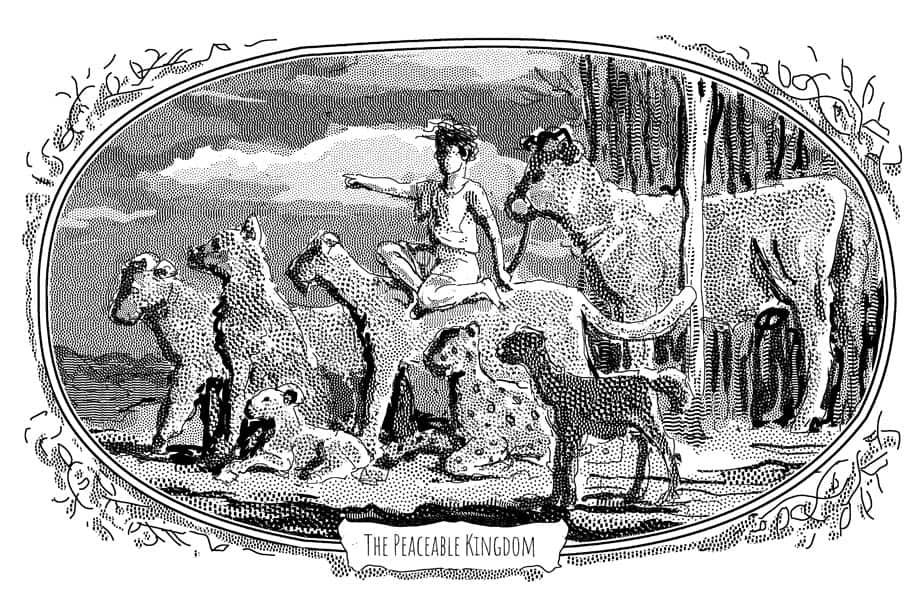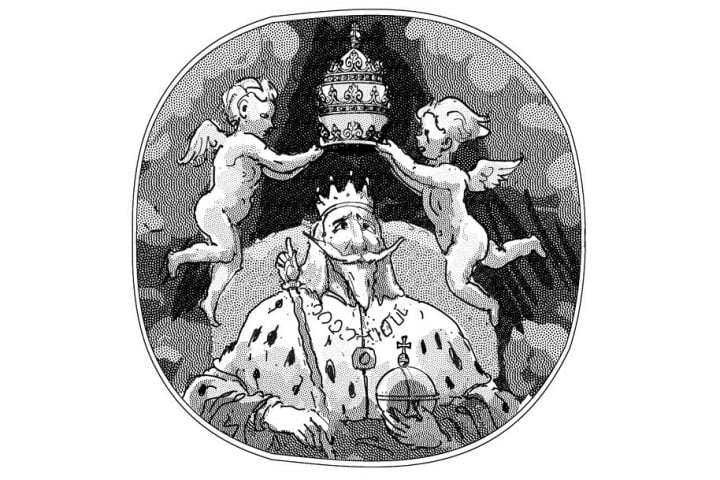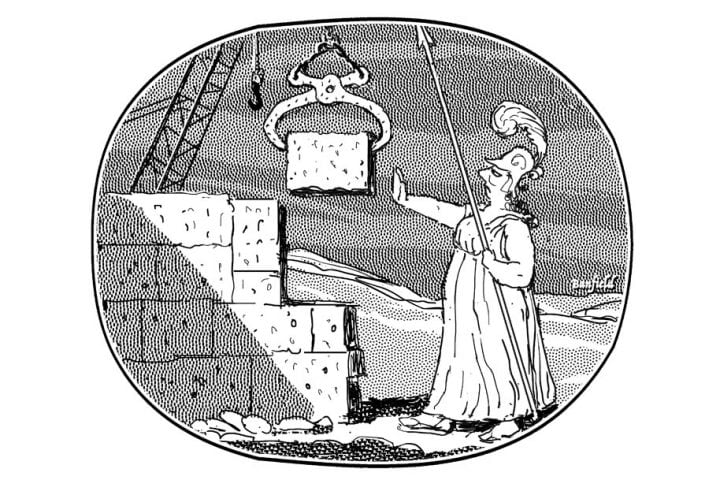Books Reviewed
Tom Holland is a public intellectual in the best British tradition, beloved of both literati and laymen. He writes television and radio shows for the BBC, comments ably on cultural matters in the Guardian, and commands a Twitter audience of over 173,000 followers. He is best known for delectably readable histories of the ancient world—Persian Fire (2005), his lively retelling of the wars between ancient Greece and Persia, was met with considerable acclaim in America as well as England. With his latest book, Holland has moved to the center of a debate in which more than just antiquity is at stake. Dominion: How the Christian Revolution Remade the World is not only an engaging study of early Christianity and its legacy in modern times; it is also an extended meditation on whether Christendom can survive without Christ.
Dominion’s thesis is that practically every major movement in the West’s history has been undertaken in a discernably Christian spirit. Everything from the Enlightenment to the sexual revolution was the product of sociological developments originating with Jesus of Nazareth and then Paul of Tarsus. This may come as a shock to Jesus’ 21st-century followers. But Holland intends to be shocking.
The first third of the book (“Antiquity”) is devoted to showing that Jesus’ sayings and Paul’s apologetics occasioned a radical upheaval in social, moral, and political practices. In the remaining two thirds (“Christendom” and “Modernitas”), Holland argues that Christianity affected whatever the Roman Empire touched, so that “even in the twenty-first century, as the tide of Western dominance palpably retreats, assumptions bred of Europe’s ancestral faith continue to structure the way that the world organises itself.”
* * *
Dominion presents every major Western conflict as one in which both sides were indebted, however distantly, to Christ. Abolitionists and slavers in America, for instance, both looked to the Bible for justification. Anti-slavery firebrands like the Quaker Benjamin Lay won out because their prophetic declamations “self-evidently went with the grain of Christian tradition”—unlike the slaveholders’ half-hearted Scriptural cherry-picking. The American Founders too, says Holland, treated as universal a set of principles which were no such thing:
That all men had been created equal, and endowed with an inalienable right to life, liberty, and the pursuit of happiness, were not remotely self-evident truths. That most Americans believed they were owed less to philosophy than to the Bible.
Nor was ours the only revolution stamped with the imprint of the Cross: 18th-century French liberals may have despised the clergy, but Holland sees them nevertheless as heirs to Christianity in their aspiration toward a universal brotherhood of man. He even contends that Karl Marx—though he professed a purely secular materialism—owed his ideal of communitarian justice to the first apostles of the early Church.
There is also, according to Holland, a traceable line of descent from “Beloved, let us love one another” (1 John 4:7), to “Love, and do as you will” (Saint Augustine’s 7th Homily on 1 John), to “All you need is love” (Sir John Lennon). The book’s penultimate chapter opens with the Beatles singing that mantra for a riotous crowd in 1967. The battles over sexual ethics that subsequently roiled the First World were battles not between Christians and non-Christians but between rival inheritors of the Christian tradition.
* * *
Evangelical opposition to free love, feminism, and open homosexuality was based on a commitment to Biblical strictures. But Holland also argues, more provocatively, that
[t]o campaign against discrimination on the grounds of gender or sexuality…was to depend on large numbers of people sharing in a common assumption: that everyone possessed an inherent worth. The origins of this principle—as Nietzsche had so contemptuously pointed out—lay not in the French Revolution, nor in the Declaration of Independence, nor in the Enlightenment, but in the Bible.
Even today, though Social Justice Warriors and MeToo litigants are often hostile to the Church, Holland thinks they aim to hoist their opponents with a distinctly Christian petard. Critics of “woke” doctrine frequently point out that it pits people against one another in an “Oppression Olympics” in which champions compete to determine who deserves the most sympathy and so the most generous redress. But rarely do we consider how remarkable it is that this gambit works—that oppression holds such cultural cachet that it can be leveraged for reparations.
All this, says Holland, is a consequence of Christian convictions so subcutaneous they have ceased to strike us as novel. Christian ethics favors the captive and the downtrodden in a manner unthinkable before the pale Galilean conquered the world. The evidence of this is the shudder of horror evinced in a modern German or Englishman by assumptions that would have been perfectly intuitive to a classical Spartan or Babylonian: “that infanticide [is] perfectly legitimate; that to turn the other cheek [is] folly; that ‘Nature has given the weak to be slaves.’” Such ancient convictions are now only endorsed in books like the Marquis de Sade’s novel Juliette (1797). That predatory French nobleman has the dubious honor, in Holland’s eyes, of being among the few philosophers who realized what breaking the Church’s shackles would really mean. Sade, like Friedrich Nietzsche, despised Christianity as the wellspring of respect for suffering and the dignity of the weak. That Sade’s sexual escapades got him locked up as a madman, even when a notoriously libertine Paris was on the brink of an anti-clerical revolution, demonstrates how totally European societies saw things in terms derived from Christianity.
* * *
On a purely stylistic level, the difficulty of what Holland succeeds in doing cannot be overstated. In particular, he has a gift for retelling ancient history in a way that is both powerful and scholarly. The historical testimony that comes down to us from antiquity is frequently patchy and contradictory, based on deep-rooted assumptions that are sometimes quite alien to us. To draw from classical sources a narrative that is at once compelling and accurate is no mean feat. Holland, who quit his Oxford Ph.D. out of frustration with academia and its associated penury, has excelled throughout his career at writing precise and almost novelistic accounts of the ancient world while avoiding the throat-clearing which frustrates most attempts to make antiquity as exciting as it was.
In Dominion, Holland’s prose remains effervescent even as he extends his story all the way from the era of the Jewish Exodus to the present day. He is known for his skills at vignette and historical portraiture, and the obscure patriarchs of the early Church are just as vivid in his telling as the charismatic leaders of the civil rights era. No less powerful are his illustrative similes: territory drops from an empire like overcooked meat falling off a bone; the remnants of an old world order hang in the air like dust from a collapsed and ruined edifice. Given that this is his most ambitious project yet, Holland does have to condense his narrative quite a bit. In the process he occasionally skates over scholarly disagreements on hotly contested topics. His own views, though they are always considered and defensible, could use more defending in some places. He summarily dismisses the early history narrated in the Hebrew Bible as inaccurate, for example, which is a fashionable but not uncontroversial way of looking at things. Still, he is never deceptive or outlandish. He tells the story as he sees it based on his extensive reading and prodigious literary gifts.
* * *
As for his argument, it is surely valid—up to a point. One would be hard-pressed to deny that Christianity transformed the Western mind. To say so is not to dismiss the enduring products of classical Greek, Roman, and Jewish thought. It is simply to suggest that Christianity so dominated what the West became as to refract even Aristotle’s metaphysics through a Christian lens. For those who lament that the sea of faith has ebbed to a perilously low tide, this may be oddly encouraging. Perhaps no matter how far we wander, we are bound to Christ with what G.K. Chesterton called “an unseen hook and an invisible line.”
For others, though, the assurance that there is no escape from Christendom will feel suffocating. Holland’s approach is akin to that of Alfred North Whitehead, who in 1929 characterized all European philosophy as “footnotes to Plato.” The Athenian’s thought, Whitehead implied, had been so powerfully compelling that even to refute Plato was to enter a conversation he started and play a game whose rules he wrote. What Whitehead said of Plato in philosophy, Holland says of the Christian Church in practically every area of life. It starts to look like a trap from which there is no exit. And this is exactly where Holland overstates his case. That our civilization began from Christian starting points is true enough. But to insist that it therefore cannot help being irrevocably Christian goes too far. Darwinists say an organism has developed into a new species once time, environment, and random mutation have rendered it incapable of reproducing with the species from which it evolved. One wonders at several points in Dominion whether the same could not be said of the movements Holland connects with Christianity.
Marx, for one, ushered into the world something quite unlike what had gone before. He may have been haunted by echoes of the gospel call to fill the hungry with good things and send the rich away empty (Luke 1:53). But since the ideology he advocated was avowedly contemptuous of supernaturalism, and since the socialist movements which came in his wake have been responsible for the deaths of professing Christians on a scale far surpassing that of the Colosseum, can we really call Marxism “a recalibration” of Christianity as Holland does? Surely by the time we reach the gulags we have arrived somewhere very different from the Vatican, no matter how possible it is to track the historical steps that led from one to the other.
* * *
Holland writes that Christianity has a “seemingly infinite capacity for evolution.” I wonder. It may be, instead, that if a civilization travels far enough from the sources of its hereditary wisdom it will reach altogether new territory. It is not necessarily possible to reject Christianity’s spiritual premises, and remain convinced of the ethical conclusions that followed from those premises. Are the inalienable rights to life, liberty, and the pursuit of happiness self-evident once we abandon our belief in the Creator who endows them? Thomas Jefferson, enamored as he was of Enlightenment optimism, may have believed universal reason made the Declaration’s maxims naturally compelling for everyone. But neither he nor his colleagues thought that republican government could do without Christian belief. “Our Constitution was made only for a moral and religious People,” wrote John Adams in 1798 to the Massachusetts militia. “It is wholly inadequate to the government of any other.”
Similar questions have recently become urgent in Europe, where a number of thinkers hope to retain their Judeo-Christian outlook without accepting the creeds of Christian orthodoxy. Holland himself is one such thinker. By his own account, Dominion began with a realization he described in a 2016 essay for the New Statesman: though he could no longer believe in the God of his Anglican upbringing, still “[i]n my morals and ethics…I am not Greek or Roman at all, but thoroughly and proudly Christian.” He reiterates this discovery in the closing pages of Dominion, which recall with a surge of affection the Biblical learning handed down to him by his generous and dignified godmother. Holland wrestles with the implications of this as an origin story for his entire worldview: “What are the foundations of [European] morality, if not a myth?” He finds some peace in accepting that the factually false tales of his godmother contained enough moral truth to produce good and useful lessons. “A myth,” he concludes, “is not a lie.”
Here Holland implicitly aligns himself with the growing trend of “Christian atheism.” Don Cupitt, sometime priest in the Church of England, wrote in The Meaning of the West (2008) that, though he did not believe in God, he still was indelibly Christian. So was anyone raised in the West: “You may call yourself a non-Christian,” wrote Cupitt, “but the dreams you dream are still Christian dreams.” The Italian philosopher Marcello Pera argued along similar lines in Why We Should Call Ourselves Christians (2008): even if Christianity is a lie in its particulars, we can still accept its general teachings as the fount of all we hold dear.
Douglas Murray, the bestselling British firebrand, is in agreement with Cupitt and Pera. He cannot believe that anybody ever rose from the dead, but he still espouses the “revolutionary moral insight” Christianity produced. In particular, Murray sees the inexhaustible forgiveness preached by Jesus as an antidote to identity politics’ endless recriminations. Dave Rubin, who is popular in the network of pundits and philosophers known as the “Intellectual Dark Web,” writes in his newly released Don’t Burn This Book that “a truth outside of us” is “the only antidote” for moral chaos. Like his mentor Jordan Peterson, Rubin seeks that governing truth in Biblical narratives which are “fundamental to our beliefs and freedoms even if we don’t want them to be.”
* * *
Holland has not, until now, been prominently associated with Christian atheism. Dominion changes that: it makes its author into one of the world’s most notable advocates for secular Christianity. Indeed, the book may be considered the first complete history of the West written from a Christian atheist point of view. It is a history that attempts to find hope for the Christian ethos in a world from which the Christian God seems to be receding. In this capacity, I cannot say I find it persuasive.
Nobody can be forced to believe, of course, and free men are free to lose faith. If Christian theology is falling out of favor, then scolding and threats of doom are unlikely to rehabilitate it. Nor is unmitigated doom necessarily the fate of a post-Christian West: many of the achievements that Holland attributes to Christianity are not unique to it, after all. The ancient Stoic philosophers, too, believed in the worth of every human person. Aristotle and his medieval Muslim interpreters were perfectly capable of pursuing natural science without the help of Francis Bacon. The fruits of Christian doctrine might be so timeless, so self-evidently good, that we can continue enjoying them after cutting away the roots of the tree that bore them.
Holland’s evidence for thinking that we can is, essentially, that we still often act as if Christianity held sway over our hearts. As he wrote in the New Statesman, we “still take for granted that it is nobler to suffer than to inflict suffering” and “we generally assume that every human life is of equal value.” Our belief in universal human worth is thus resilient enough to survive the death of God. But as Nietzsche insisted, and Holland recalls, moral sensibilities that have lost their intellectual justification are apt to persist unexamined—until someone strong and bold enough comes along to jettison them. The urgent question on the table is not whether Christian ethics still linger without God, but whether they cohere—not whether we believe in Christian values but why we should continue to believe in them or even want to. If there are philosophically sound reasons to be a Christian atheist—if the virtues of unceasing mercy and equal treatment for all remain logically apparent without the stipulation that God loves every human being—then perhaps the great edifice will remain upright. But if not—if the God business was actually a load-bearing column and not a decorative pilaster—then what comes next will look a lot more like de Sade than Saint Paul.
* * *
It is possible that, as a Christian myself, I am biased—bound to view a real God as essential. But it was not, contra Holland, merely “the image of a god dead on a cross” that inspired so many people to bleed, build, and toil in the name of freedom and justice. The Christians of the West made the sacrifices they did because they believed in a real and breathing God, one who truly died and was resurrected in the flesh. To treat that story as a fable, even a centrally important one, is to make a meaningful and untested departure from the faith of our fathers. I am unconvinced it will work.
One could frame the matter the other way round. If the moral truths we cherish emerged organically from centuries of honest effort to serve the living God, then perhaps that in itself is reason to reconsider whether God’s existence is so implausible. “By their fruits you shall know them”: the carpenter from Nazareth spoke well when he said that the nature of a belief is made manifest in the actions that spring from it, like a harvest springing from seeds beneath the ground. If the fruit is good, perhaps the belief is true. With characteristic expertise and panache, Tom Holland shows in Dominion that the most distinctive fruits of Christian piety in the West have been unparalleled industry, liberation, and charity. He and his fellow Christian atheists might consider the implications of this fact, and revisit the seeds from which those fruits sprang.





